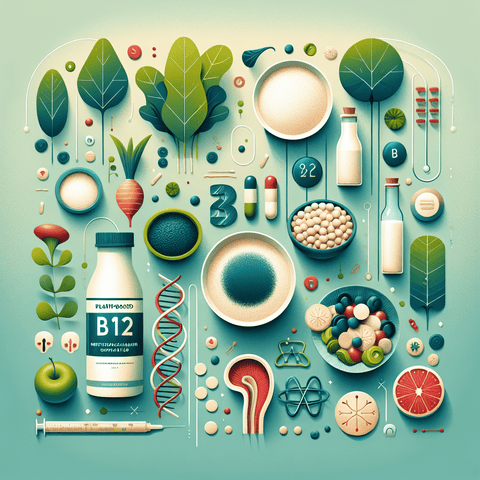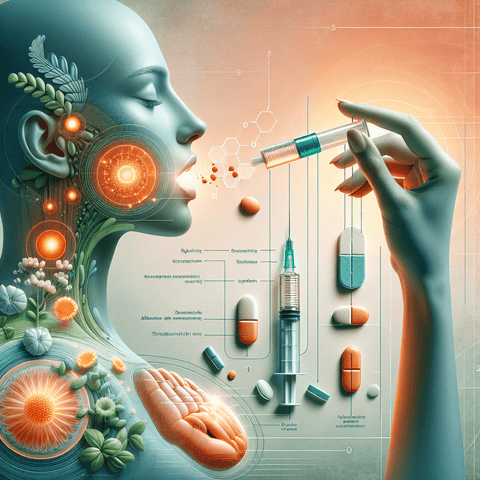Introduction
Vitamin B12, also known as cobalamin, is an essential nutrient vital for maintaining various physiological processes, including nerve function, red blood cell formation, and DNA synthesis. Despite its importance, B12 deficiency remains a common concern among individuals following vegan diets, primarily because natural sources of the vitamin are predominantly found in animal-derived foods. As more people shift toward plant-based lifestyles due to ethical, environmental, and health considerations, understanding how vegans can uphold adequate B12 intake becomes increasingly critical.
The purpose of this comprehensive guide is to explore reliable vegan sources of B12, examine supplementation options, and provide practical strategies to prevent deficiency. Whether you're a long-term vegan or considering transitioning to a plant-based lifestyle, remaining informed about B12 sources ensures you can maintain optimal health without compromising your dietary choices.
Vegan B12: The Cornerstone of Plant-Based Nutrition and Supplements
Vitamin B12 is unique among essential nutrients because it is primarily produced by microbes, and naturally occurring B12 is predominantly found in animal products such as meat, dairy, and eggs. These foods accumulate the vitamin through the animals’ gut microbiota, making them rich sources available to humans through diet. For vegans, however, these sources are unavailable, presenting a substantial challenge.
The biological roles of B12 are profound. It is crucial for nerve cell health, supporting the integrity of the nervous system, and it plays a pivotal role in the formation of healthy red blood cells, preventing anemia. Additionally, B12 is essential for DNA synthesis, ensuring proper cell division and genetic stability. Deficiency in B12 can lead to neurological issues, fatigue, anemia, and irreversible nerve damage if left unaddressed.
Because natural plant-based sources of B12 are limited and often unreliable, vegans must rely heavily on fortified foods and dietary supplements to meet their needs. Fortified foods include cereals, plant-based milks, meat substitutes, and nutritional yeasts that have been supplemented with B12 during processing. These products are designed to provide a consistent and bioavailable form of B12 suitable for vegan consumption.
Supplements, especially in tablet, sublingual, or spray form, serve as a reliable solution. Scientific research emphasizes that synthetic B12 forms, such as cyanocobalamin and methylcobalamin, are stable, safe, and effective to prevent deficiency. Emerging research continues to support the importance of fixed-dose supplementation, especially given the variability in individual absorption capacities. Vitamins B12 supplements fill the critical gap where dietary sources fall short — an important aspect of a vegan health plan.
Looking ahead, innovative approaches like bioengineered B12 and lab-grown vitamins may offer even more holistic solutions for vegans in the future. These technological advancements could provide sustainable, naturalistic B12 sources that align with plant-based principles while ensuring maximum bioavailability and safety.
Plant-Based B12: Exploring Natural and Fortified Sources for Vegans
One of the biggest misconceptions about a vegan diet is the assumption that natural plant foods contain adequate B12. In reality, virtually no plant foods naturally contain bioavailable B12 in significant amounts. Some claims suggest that certain algae, mushrooms, or fermented foods may contain B12, but these are often contested due to inconsistent B12 content and bioavailability.
Fortified plant foods are the most dependable source of B12 for vegans. Fortified cereals, plant-based milk (such as soy, almond, or oat milk), nutritional yeast labeled with added B12, and meat substitutes are among the most reliable options. It is essential to read labels carefully because not all products are fortified, and the degree of fortification can vary significantly.
Bioavailability concerns play a critical role in dietary planning. The form of B12 used in fortified foods is typically cyanocobalamin or methylcobalamin, which is effectively absorbed and utilized by the body. The bioavailability from fortified foods is generally high, especially when consumed regularly and in adequate amounts.
Regarding fermented foods and algae, some varieties, such as certain types of nori or spirulina, have been claimed to contain B12. However, research indicates that they often contain inactive analogues of B12 or B12 analogues that are not bioavailable, leading to potential false reassurance about their efficacy as B12 sources. Thus, reliance solely on these foods is not recommended for maintaining B12 status.
In recent years, advances in microbial fermentation have opened the door for the production of plant-based B12 that is identical in structure and bioactivity to synthetic forms. These innovations promise to expand the natural B12 repertoire of plant foods, aligning with vegetarian and vegan principles while ensuring effective B12 intake.
Vegan Vitamin B12 Sources: A Guide to Reliable Intake Strategies
For vegans, the most reliable strategy to ensure adequate B12 intake involves a combination of fortified foods and supplements. While some brands of plant-based products are fortified with B12, the consistency and content can vary. Hence, incorporating a daily B12 supplement is often recommended by health authorities and vegan advocacy groups for peace of mind and nutritional safety.
When choosing vegan B12 supplements, options include tablets, sublingual lozenges, sprays, or liquids. Cyanocobalamin is the most common form, appreciated for its stability and cost-effectiveness. Methylcobalamin, on the other hand, is methylated and sometimes preferred by individuals with specific metabolic concerns, though both forms are effective for preventing deficiency.
Ideal dosage depends on individual factors such as age, health status, and body stores. The general recommended daily intake is approximately 2.4 micrograms for adults, but many vegans opt for higher doses, such as 1000 micrograms weekly or daily, to ensure adequate absorption. This approach compensates for potential absorption issues due to age or gastrointestinal health. For high-quality and effective supplements, consider options such as those offered by reputable brands like Topvitamine.
As the field of B12 supplementation continues to evolve, future options like bioengineered or lab-grown B12 supplements may offer even more targeted delivery mechanisms. Staying informed about such innovations will be beneficial for vegans committed to optimal health.
To ensure consistent B12 intake, integrate supplementation into your daily routine, choosing a form and dose that suits your lifestyle and absorption capacity. Combining fortified foods with supplements often provides a safety net, particularly during periods of increased nutritional needs, such as pregnancy or elderly age.
Prevention of B12 Deficiency: Recognizing and Managing Risks in a Vegan Diet
Vitamin B12 deficiency can manifest through a host of symptoms ranging from fatigue and weakness to neurological impairments such as numbness, tingling, or cognitive disturbances. In severe cases, deficiency can cause irreversible nerve damage and hematological issues, making early detection and prevention crucial.
Understanding individual risk factors such as age, gut health, certain medical conditions (like pernicious anemia), and medication use (notably proton pump inhibitors or metformin) is important. Vegans with compromised gastrointestinal absorption or older adults are particularly vulnerable to deficiency, despite their dietary choices.
Regular monitoring through blood tests measuring serum B12, methylmalonic acid, or homocysteine levels provides insight into biochemical status and helps prevent deficiency. Healthcare professionals can recommend testing intervals based on individual risk factors, with most guidelines suggesting at least annual screenings for vegans.
Prevention strategies revolve around consistent intake through fortified foods and supplements. When deficiency is detected early, increasing supplement doses or optimizing dietary sources can reverse deficits. Nonetheless, neglecting B12 intake can lead to long-term health consequences, underscoring the importance of nutritional vigilance.
Long-term health benefits include sustaining neurological integrity, preventing anemia, and supporting overall metabolic health. As evidence continues to evolve, health authorities emphasize that vegans should proactively safeguard their B12 status, ensuring their dietary patterns support their long-term health goals.
Plant-Derived B12: The Potential and Limitations of Nature-Based Options
Despite the scarcity of naturally occurring plant B12, ongoing research explores avenues to enhance the availability of B12 through plant-based cultivation methods. Some claims suggest that certain algae, like spirulina or chlorella, may contain B12, but scientific analysis reveals that these often contain B12 analogues—compounds structurally similar to B12 but biologically inactive or less bioavailable. This misleads consumers into believing they are obtaining sufficient B12 from these sources.
Verification of B12 content and bioavailability in these algae and fermented foods remains a challenge. Many studies have shown a lack of consistent B12 levels or have demonstrated that B12 analogues can interfere with absorption of true B12, potentially leading to deficiency even when consuming these foods regularly.
Recent technological advancements focus on cultivating B12-producing microbes during plant growth—either through microbial fermentation or genetic modification—aiming to produce bioavailable, natural B12 within plant tissues. These innovations could revolutionize the availability of plant-based B12 sources in the future, making natural options more consistent and effective.
Furthermore, bioengineering and biotechnological research are exploring environmentally sustainable ways to produce B12 via microbial fermentation processes that are compatible with vegetarian and vegan principles. These efforts aspire to develop a new generation of plant-friendly B12 sources, reducing dependence on synthetic or animal-derived supplements.
As research progresses, informing consumers about which algae and fermented foods are reliable B12 sources—or not—is critical to prevent misinformation. The future holds promise for more plant-friendly superfoods fortified or enriched with bioavailable B12, but until then, fortified foods and supplementation remain the most dependable strategies.
Vegan B12 Supplementation: Making Informed Choices for Optimal Health
Choosing the right B12 supplement involves understanding the forms available and their respective benefits. Cyanocobalamin, the most widely used supplement form, is highly stable and cost-effective. It effectively raises B12 levels in the body with typical daily doses of 25–100 micrograms, which are well within safe margins. Methylcobalamin offers a methylated form that some individuals prefer for metabolic reasons, although clinical differences in absorption and efficacy are minimal for most.
When selecting a supplement, consider factors such as bioavailability, dosage, form, and lifestyle compatibility. Sublingual tablets or sprays can provide faster absorption through mucous membranes, which may be advantageous for those with gastrointestinal issues. Additionally, high-dose weekly supplementation can be effective for those with absorption concerns while maintaining serum B12 levels.
Supplementing with B12 in conjunction with fortified foods creates a comprehensive approach, reducing the risk of deficiency due to inconsistent dietary intake. Many reputable brands, including those available at Topvitamine, offer high-quality vegan B12 options.
It's essential to follow dosage instructions and consult healthcare providers periodically for blood testing, especially if adherence to supplementation is inconsistent or if health conditions change. Personalized plans ensure that supplementation remains effective and safe, preventing potential deficiency.
Emerging innovations such as bioengineered B12 supplements, designed to mimic natural forms more closely, may become more prevalent, offering targeted, sustainable options tailored to vegan needs. Staying informed about these advancements can help vegans make better choices in optimizing their health.
Practical Tips for Ensuring Adequate Vegan B12 Intake
Maintaining adequate B12 levels on a vegan diet requires intentional planning and routine. Incorporate fortified foods into daily meals—such as breakfast cereals, plant-based milks, and nutritional yeasts containing added B12—as staples. These foods are convenient sources that help ensure consistent intake, especially when combined with supplementation.
Establish a daily supplement regimen, choosing a form and dose suitable for your body and lifestyle. Many vegans find that taking a supplement in the morning alongside breakfast helps establish a routine. Regularly monitor B12 status through blood tests, especially if you experience health changes or in age-related contexts.
Stay informed about new research, emerging supplement options, and fortified products by consulting trusted sources and healthcare professionals. Collaboration with dietitians or healthcare providers ensures your B12 management plan is personalized and up-to-date.
Building awareness of the importance of consistent B12 intake is vital for long-term health. Even minor lapses in supplementation or fortified food consumption can lead to deficiencies, so mindfully maintaining these habits is essential.
Looking forward, technological innovations such as bioengineered B12 or lab-grown vitamins may offer additional convenient and sustainable sources. Keep an eye on developments in this space to optimize your nutritional strategy.
Conclusion
Ensuring adequate vitamin B12 intake without animal products is a feasible goal through a combination of fortified foods, supplements, and ongoing health monitoring. While natural plant sources of B12 are limited and often unreliable, advances in food fortification and biotechnology provide robust options for vegans committed to maintaining optimal health.
Proactive management, including routine testing and personalized supplementation, remains the cornerstone of preventing deficiency. Staying informed about emerging research, innovative products, and best practices equips vegans to navigate their nutritional landscape confidently.
As the field evolves, so do opportunities to access more naturalistic, sustainable B12 sources aligned with vegan principles. The future of vegan nutrition looks promising, with ongoing advancements promising enhanced safety, efficacy, and environmental sustainability.
Remember: proactive B12 management isn't just about avoiding deficiency—it's about supporting your overall wellbeing and ensuring your diet sustains your health for years to come.
Q&A Section
Q1: Why is B12 intake particularly challenging for vegans?
A1: Because natural B12 sources are primarily found in animal products, vegans need to rely on fortified foods or supplements. Unlike omnivores, they cannot obtain sufficient B12 from unfortified plant foods, making supplementation essential for maintaining adequate levels.
Q2: Are plant-based foods like spirulina or mushrooms reliable sources of B12?
A2: Generally no. Many plant-based foods, especially algae and fermented foods, contain inactive B12 analogues that are not bioavailable. They do not reliably meet B12 needs and should not replace fortified foods or supplements.
Q3: What is the recommended daily dose of B12 for vegans?
A3: The general recommendation is about 2.4 micrograms daily for adults, but many vegans take higher doses, such as 1000 micrograms weekly, to ensure absorption and storage. It's best to consult with a healthcare professional for personalized advice.
Q4: Which form of B12 supplement is preferable for vegans?
A4: Cyanocobalamin is the most common and stable form, widely recommended. Methylcobalamin is also effective and preferred by some for metabolic benefits. Both are suitable for vegans, but choosing reputable brands is important.
Q5: How can I monitor my B12 status effectively?
A5: Routine blood tests measuring serum B12, methylmalonic acid, and homocysteine levels can help assess B12 status. Regular testing—at least annually—is advisable, especially if you have risk factors or are on high-dose supplementation.
Important Keywords
- Vegan B12 sources
- Plant-based B12
- Vegan B12 supplements
- Fortified foods
- B12 deficiency prevention
- Bioavailable B12
- Vegan nutrition
- Vitamin B12 supplementation
- Lab-grown B12
- Vegan health tips



